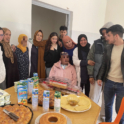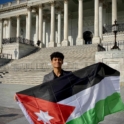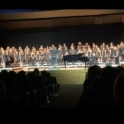Maryame has taken the lessons learned from her exchange year to make a difference in her community.
STORIES
YES 20th Anniversary Spotlight: Maria Ana Espinosa
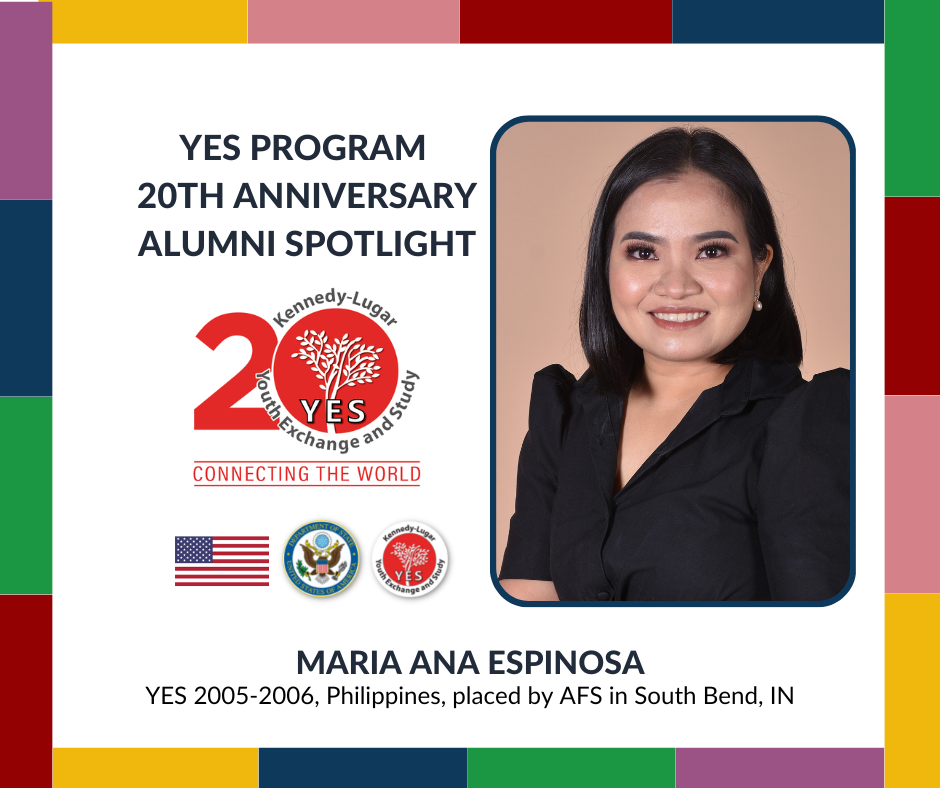
By Maria Ana Espinosa (YES 2005-2006, Philippines, placed by AFS in South Bend, IN)
What are some of your biggest accomplishments since becoming an alumni of the YES program?
Since I became an alumna of the YES program, I graduated with a BS in Economics from the University of the Philippines. My international education and trainings since then consist of being an AIESEC Development Intern in Hangzhou, China in 2011; one of the Philippino representatives on the Young Southeast Asian Leadership Initiative (YSEALI) Regional Workshop in Advancing Gender Equality held in Brunei in 2019; and a mentor in U.S. Department of State’s Civic Education Week held in Washington D.C. in 2020.
I also attended law school, where I became a trained law debater and mooter. My team was the Quarterfinalist in the 2017 Stetson International Environmental Moot Court Competition, and the Semifinalist in the 2017 Moot Court National Rounds on International Humanitarian Law. Since passing the bar, I have dedicated my time as an advocate of human rights and gender equality and published several journal articles discussing gender equality, internal displacement, and human rights. I also worked at the Supreme Court of the Philippines and was appointed as the Assistant Committee Secretary of the Supreme Court Committee on Human Rights and International Humanitarian Law.
In 2019, with the help of other YES alumni, I started the project, Touch Me Not: Empowering the Youth to Prevent Sexual Abuse. It is a one-day workshop where youth are taught the laws protecting them against rape and other forms of harassment, as well as basic self-defense skills to protect themselves. I am also the founder of Project Urduja: Empowering Emerging Filipina Leaders, which is a year-long mentoring program to teach women leaders, between the ages of 18 and 30, about leadership rooted in gender equality and social justice. This project won the Alumni Engagement Innovation Fund 2020 (AEIF), a grant by the U.S. Department of State to support initiatives that promote shared values and innovative solutions to global challenges. Project Urduja also won a Global Affairs Canada Award that will allow the project to continue until 2024.
Currently, I am the Program Officer of The Asia Foundation - Law and Human Rights Unit. My work entails extensive collaboration between the Commission on Human Rights and human rights organizations to lead projects for the promotion and protection of human rights in the Philippines.
What are some of your favorite memories from the YES program?
I have many favorite memories during the YES program but here are some that are most precious to me:
1. Going to the United States to participate in the YES program was the first time I rode a plane and traveled abroad. Moreover, I was traveling with only my fellow YES scholars from the Philippines and without my family. We were all anxious of what awaited us, but we were also excited about all of the possibilities that lay ahead. It was such a sweet memory to share among my YES cohort. We were all young dreamers who were just starting to discover that the world can be our oyster if we believe and work hard for it.
2. Celebrating different holidays with my host family. Some holidays, such as Thanksgiving and Memorial Day, are not celebrated in the Philippines, and experiencing them for the first time was an incredible feeling. On the other hand, other holidays, such as Halloween and Christmas, are celebrated differently in my country. I loved observing and taking part in the traditions of my host family during these holidays.
3. Experiencing snow for the first time. Philippines is a tropical country without snow, and when I first witnessed a snowfall, I couldn't hide my excitement. I hated the cold, but I loved the snow.
4. Joining different clubs in school. Through the clubs I joined, I made many friends that I still cherish today. One of my favorite afterschool activities was the theater club. It really boosted my confidence and allowed me to explore my creative side.
What are some of the ways you’ve stayed connected to fellow alumni since your exchange experience? What about your host family or friends?
I constantly communicate with my host family and friends. I visited them in 2020 after becoming a mentor in the Civic Education Week and I loved seeing them all again. As for my fellow alumni, we are always working together in our advocacies. As I stated earlier, in 2019 we started the project, Touch Me Not: Empowering the Youth to Prevent Sexual Abuse. It is a one-day workshop where the youth were taught of the laws protecting them against rape and other forms of harassment, as well as basic self-defense skills to protect themselves.
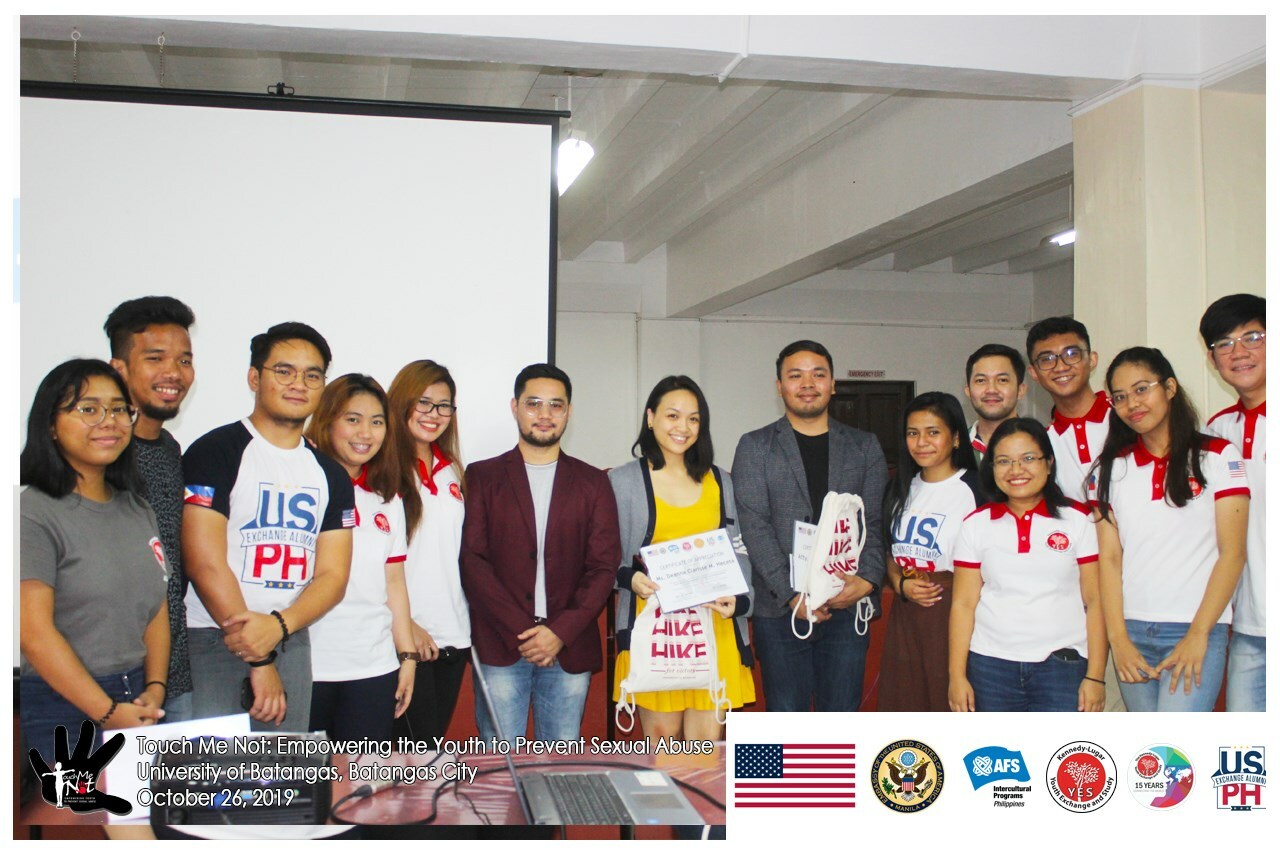
How did the YES program impact you professionally? What about personally?
My YES year taught me to listen to different perspectives, to respect our differences, and to celebrate the diversity of culture and history in each one of us. I can now be in any place around the globe and easily relate to people. I learned to talk with anyone without bias or prejudice, and only with a sincere desire to get to know the person and learn from his or her experiences.
When I returned to the Philippines, I became an assertive individual, but respectful of the multitude of perspectives of each person. The characteristics I developed during my YES year drew my interest towards law and human rights. As someone who is very outspoken, being a human rights lawyer gave me the opportunity not only to speak for myself but also for others who are seeking justice in the society.
What is one piece of advice you would give to current or future YES program participants?
To the students, my advice is to use this opportunity to learn as much as they can,
and make it their springboard for a successful and meaningful life. They will never be the same person again after this program. The lessons that they learn from this year will stay with them for the rest for their lives and it will affect how they choose their careers and how they make life decisions. Their perspective will be transformed to serving the greater good of the community. Their year in the U.S. is the best opportunity to explore themselves and the world, and when they return to their respective countries, to pay forward everything that they learned.
In 10, 20, or even 30 years, what do you hope the legacy of the YES program will be?
I hope that in several decades, the YES program will have alumni who will uplift the lives of their communities and even their nations. The impact of the program does not end with the students; it is only the start of the ripple that is created.
Read more about Maria's story in our archives.


